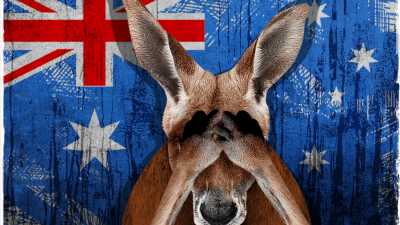Australia’s reputation has been hit. We need more than Sarah Snook for success

Save articles for later
Add articles to your saved list and come back to them any time.
Australia could do with getting some soft power points quickly on the board. Sarah Snook, the South Australian breakout star of the hit series Succession, can only do so much. The Australian Chamber Orchestra – one of this country’s premium artistic exports – can only undertake so many foreign tours. As the Ashes approach, Australia can no longer deploy another of its beloved ambassadors, Shane Warne, to sprinkle his larrikin charm.
True, the Vivid festival in Sydney, with its stream of uplifting imagery, has fast become something of an annual sugar hit for foreign picture desks. The Opera House and “coathanger” have always done a lot of heavy lifting when it comes to promoting Australia’s image abroad. But this year’s light show has come in the midst of a spate of dismal international headlines.
Illustration: Dionne Gain. Credit:
In a defamation ruling heard around the world, Australia’s most decorated living soldier, Ben Roberts-Smith, was found to be directly involved in the murder of four unarmed Afghan prisoners. In another Australian story that generated considerable international attention, the country’s most prominent Indigenous broadcaster, Stan Grant, was hounded off the air after being targeted by racist abuse following the ABC’s coverage of the coronation.
Both stories have incurred broader reputational damage for Australia because the coverage went beyond the individuals at their core. The BBC described Roberts-Smith as “the public face of accusations of Australian war crimes in Afghanistan”. In its reporting of Stan Grant, The New York Times delivered this damning assessment: “While Australia celebrates its multiculturalism, it lags behind other Western countries in the diversity of its government, boardrooms and media institutions, and is still reckoning with a bloody colonial past that has never fully receded.”
What is especially noteworthy about Australia’s run of bad foreign press is that it has come from across the political spectrum. Recently, left-leaning commentators in Britain have bemoaned how the British prime minister, Rishi Sunak, has ventriloquised the slogan “stop the boats” and mimicked Australia’s “Pacific solution” with its “Rwanda solution” asylum policy.
During the coronavirus pandemic, Australia was copping it mainly from the right. “Prison Island” was the taunt at the height of the lockdowns from the conservative magazine The Spectator. The right-wing American talk show host Candace Owens even called for the deployment of US troops. “When do we invade Australia?” she screamed, “and free a suppressed people who are suffering under a totalitarian regime?”
The good, the bad and the ugly of Australia in 2022: the good: Sarah Snook in Succession; the bad: Victoria Cross winner and war criminal Ben Roberts-Smith: the ugly; broadcaster Stan Grant was forced him off the air because of racist abuse.Credit:
In 2020, the Brereton report tarnished this country’s Digger tradition by uncovering credible evidence that members of the Australian special forces had committed war crimes in Afghanistan. Before that, in 2018, came the Sandpapergate ball-tampering scandal, which desecrated the near-sacred Baggy Green. Reaching back further, there was Julia Gillard’s misogyny speech in 2012, which brought sexism in Australian politics to the world’s attention. Throughout this century, Australia’s foot-dragging on climate change has also been a staple – it would be inapt to call it an evergreen – of negative international coverage.
Maybe it is too strong to say that Australia is in a reputational ditch. And here it is worth bearing in mind that its two chief allies – the United States and United Kingdom – are presently in deeper holes. Nor should we discount the international impact of countervailing storylines, such as the success of the same-sex marriage postal survey in 2017, which was celebrated in New York, the city where I was living at the time, with the illumination of the Empire State Building in rainbow colours.
Yet at the same time it is hard to imagine a publication with the international clout of The Economist publishing an equivalent of its adulatory 2011 cover, which heralded Australia as “The Next Golden State”. Presently, Australia does not exhibit that same lustre.
Writing in these pages last year, I argued that the referendum on codifying much of the spirit of the Uluru Statement from the Heart would also be a testament from the Australian soul and that a No vote could therefore be devastating for the country’s international reputation. The way that the debate has unfolded since then, and the opportunity squandered by the Liberal leader Peter Dutton for bipartisanship, has only heightened that concern. Such is the nuance-free nature of modern-day discourse that, on the morning after a No vote, Australia could easily find itself tagged as an Alabama of the South Pacific.
Yet, the corollary of holding such a historic referendum is that a Yes vote could help expunge any lingering international impression that Australia is a racially regressive redoubt, and become the most timely of detoxicates.
For sure, the Voice referendum is too important to be reduced to an exercise in global PR, a soft power showcase. But nor can it be seen in isolation. Here is the chance for Australia to determine its self-image. Here is the opportunity for Australians to write their own story.
Nick Bryant is a senior policy fellow at Sydney University and the author of The Rise and Fall of Australia: How a Great Nation Lost Its Way.
The Opinion newsletter is a weekly wrap of views that will challenge, champion and inform your own. Sign up here.
Most Viewed in National
From our partners
Source: Read Full Article

